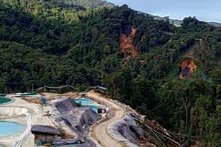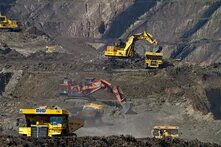Almost two-thirds of the heavy rare earths dysprosium and terbium on the global market come from Myanmar. How should Germany and Europe deal with the mining of urgently needed rare earths in the civil war-torn country of Myanmar?

Europe's industries need rare earths, and not just for the green transformation. They are indispensable for producing batteries, semiconductors, magnets for electric motors, and wind turbines. However, the continent only has a few deposits of rare earths, which have not yet been mined - the impact on the climate and environment is enormous, and the processes are complex. Instead, Europe sources the necessary components such as magnets - the so-called permanent magnets and magnet alloys - predominantly from China, the global pioneer in the preparation and processing of rare earths. So far, it has been almost impossible to find suppliers outside China in this highly specialized industry. However, China is also dependent on a third country for the procurement of raw materials: Myanmar.
The Mining Endangers the Livelihoods of Many People
Almost two-thirds of the heavy rare earths dysprosium and terbium on the global market come from Myanmar.
The civil war-torn country, which has been in a permanent crisis since a military coup in 2021, is the global market leader in the mining of the so-called heavy rare earth dysprosium and terbium. According to Chinese trade data, China imported around 41,700 tons of these critical raw materials from Myanmar in 2023 - more than twice as much as the domestic quota. Other countries such as the USA, Australia, and Brazil only mine small quantities of the specific subgroup of heavy rare earths. China and Myanmar are therefore indispensable in the supply chain, as dysprosium and terbium are essential components of so-called permanent magnets. The minerals ensure higher temperature resistance and improved durability of the magnets. Permanent magnets are installed in over 95 percent of all-electric cars and are also used in wind turbines. They are also used in industrial robots, cooling generators, heat pumps, electric motors, washing machines, microwaves, vacuum cleaners, and dishwashers. In 2024, Germany was the top importer of these components from China - and the trend is rising.
But the price is high: in the remote Kachin region in the mountainous north of Myanmar, the minerals are flushed out of the ground using chemical processes - often in disregard of basic environmental and labor standards. The resulting contamination endangers rivers, soil, and groundwater - and thus the livelihoods and health of many people. For years, mining was controlled by militias allied with the military junta. The revenues thus also flowed into the war machine and the oppression of the population, which is fighting fiercely for democracy.
Resistance Army Now Controls Mining and Trade
Recently, the balance of power has shifted: at the end of 2024, an ethnic resistance army, the "Kachin Independence Organization/Army" (KIO/A) succeeded in taking control of the mines and trade with China. Since then, the local population has been hoping for better working conditions and greater environmental protection. In the meantime, the KIO/A is levying new export taxes on the minerals - a signal of growing regional ambitions amid ongoing instability.
Germany and Europe are facing a difficult balancing act. Following EU Commission President Ursula von der Leyen's call for "de-risking", new sources of supply for critical raw materials are to be developed in addition to the Chinese ones. However, this will take years in the case of heavy rare earths. At the same time, Europe's industries already have a responsibility today: technological progress must not come at the expense of the environment and human rights in countries of the Global South such as Myanmar.
Myanmar exemplifies the global challenges of a sustainable transition.
CDU/CSU and SPD Want to Repeal Supply Chain Law
There is already a legal framework that translates this responsibility into German law: since 2023, the Supply Chain Due Diligence Act (Lieferkettensorgfaltspflichtengesetz, LkSG) has obliged larger companies to identify and track environmental and human rights risks in their supply chain and to work on improvements or, as a last resort, to phase them out. However, the future governing coalition of the CDU/CSU and SPD has announced in the coalition agreement that it will abolish the law, which the same coalition introduced in 2021, citing bureaucratic burdens. In doing so, they fail to recognize that the LkSG not only creates obligations but also protects companies: those who know their supply chains can manage risks better - be it through diversification or targeted influence on local standards.
Those who know their supply chains can manage risks better.
Should the LkSG be overturned, it will return via European law by 2028: however, a key strength of the European directive compared to the German Supply Chain Act, namely the explicit consideration of the entire supply chain, is threatened by a new regulatory proposal (omnibus) with the paradoxical argument of reducing bureaucracy. The European Council is due to vote on this before the end of May.
Good Working Conditions Reduce the Risk of Export Interruption
The risks posed by the civil war in Myanmar to the availability and global price of heavy rare earths became apparent in autumn 2024: when the KIO/A fought against the military junta along the Chinese border and took control of the mines, China unceremoniously closed border trade. After the takeover, the KIO/A in turn announced a pause in exports. Although trade has now resumed, the price of terbium has risen significantly by more than 21 percent. Almost two-thirds of the heavy rare earths dysprosium and terbiumon the global market come from Myanmar. It is therefore worth taking a closer look there and working towards improving standards - in the interests of the local population as well as our own: where conditions are right, the risk of exports being interrupted decreases.
Under Donald Trump, the USA is retreating from responsibility and standards in resource extraction. However, Germany and Europe should seize the opportunity to become global champions of a genuine, diversified, and resilient green transformation - because Myanmar is not a special case, but exemplifies the global challenges of a sustainable transition.
This article was published first at Tagesspiegel Background.

